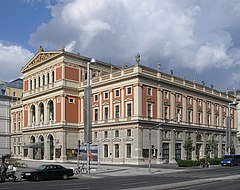Wiener Musikverein
| Wiener Musikverein | |
|---|---|

Wiener Musikverein, June 2006
|
|
| General information | |
| Type | Concert hall |
| Architectural style | Neoclassical |
| Town or city | Vienna |
| Country | Austria |
| Current tenants | Vienna Philharmonic |
| Inaugurated | 6 January 1870 |
The Wiener Musikverein (German pronunciation: [ˌviːnɐ muˌziːkfɛɐ̯ˈʔaɪ̯n]; Viennese Music Association), commonly shortened to Musikverein, is a concert hall in the Innere Stadt borough of Vienna, Austria. It is the home of the Vienna Philharmonic orchestra.
The "Great Hall" (Großer Saal), due to its highly regarded acoustics, is considered one of the finest concert halls in the world, along with Berlin's Konzerthaus, the Concertgebouw in Amsterdam, and Boston's Symphony Hall. With the exception of Boston Symphony Hall, none of these halls was built in the modern era with the application of architectural acoustics, and all share a long, tall, and narrow shoebox shape.
The building is located on Dumbastraße/Bösendorferstraße behind the Hotel Imperial near the Ringstraße boulevard and the Wien River, between Bösendorferstraße and Karlsplatz. However, since Bösendorferstraße is a relatively small street, the building is better known as being between Karlsplatz and Kärntner Ring (part of Ringstraße loop). It was erected as the new concert hall run by the Gesellschaft der Musikfreunde, on a piece of land provided by Emperor Franz Joseph I of Austria in 1863.
The plans were designed by Danish architect Theophil Hansen in the Neoclassical style of an ancient Greek temple, including a concert hall and a smaller chamber music hall. The building was inaugurated on 6 January 1870. A major donor was Nikolaus Dumba, industrialist and liberal politician of Greek descent, whose name the Austrian government gave to one of the streets surrounding the Musikverein.
...
Wikipedia
